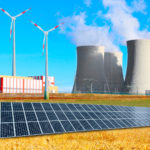Legislation, the essential framework for the development of renewable energies
Our planet’s health depends on the awareness and collaboration from every single person in it. It depends on the adoption of clean and renewable energies that replace finite and polluting sources. Political and climatological factors also have an impact, but technological development and the laws that support and drive their adoption are indispensable.

Barely one year ago, during the National Clean Energy Summit held in Nevada, U.S. president Barak Obama officially called for the need to promote the use of green energy. While he presented Walmart, Google and Apple as examples of some of the leading U.S. companies that were betting on clean power sources, he also denounced the efforts by the traditional energy sector to hamper the development of renewable energies, and stressed the need to promote self-consumption among particulars. “These companies are all for free market, until it’s solar that’s working and people want to buy, and suddenly you’re not for it anymore,” said the President.
The United States seems determined to implement a number of actions to introduce and promote the use of renewable energies. The United State’s Energy Efficiency Policy of year 2005 offers consumers and federal companies tax incentives to purchase hybrid electric vehicles, build and renovate green buildings and buy energy-efficient devices and products. Also, a series of highly valuable research and development investments are being carried out.
These initiatives have succeeded at encouraging institutions, companies and users to embrace the concept of energy efficiency. All these programs are backed by the U.S. Department of Housing and Urban Development (HUD), which offers supervisory and technical support services. The Federal Housing Administration (FHA), on the other hand, is responsible for managing the budget and assigning it among communities and companies involved, as explained in Xataka’s website.

Another thriving region is Latin America, where, according to inter-governmental organization IRENA (International Renewable Energy Agency), activity in the field of renewable energy is growing fast, and these technologies are garnering increasing levels of attention. Finally, China has become the world’s top investor in renewable energy.
According to the Foundation for Energy Efficiency, Europe is the exception and is currently swimming upstream. According to a UN, in 2015 the budget allocated to this heading decreased by 21%, from €57.4 billion in 2014 to €42.8 billion.
And Spain seems to be one of the most adamant advocates of this European stance against the worldwide trend. Indeed, investments and expectations plunged in the country over that same period of time, as a result, mainly, of the recently enacted renewable energy laws.
Recent Regulations
The entry into force in Spain of Royal Decree 900/2015, on October 9th, "consumers covered by any self-consumption modality will be subjected to distribution and transport grid access fees to contribute to cover the costs of said networks, and will be charged based on actual network usage.”
Paradoxically, this decree contradicts the guidelines of the European Parliament mentioned at the beginning thereof; Directive 2009/28/CE, of the European Parliament and the Council, of 23 April 2009, on the promotion of the use of energy from renewable sources and amending and subsequently repealing Directives 2001/77/EC and 2003/30/EC, established the “the obligation to streamline and expedite administrative procedures for the authorization and connection.”
Therefore, entrepreneurs, consumers and experts have criticized unanimously these regulations, which were announced last year and had an immediate and profound impact on the sector. To this regard, the Association of Renewable Energy Companies (APPA) announced that it will exhaust all legal and administrative avenues to defend the interests of its members.
Tax Policies
Indian climatologist Veerabhadran Ramanathan, professor of Atmospheric Science at Scripps Institution of Oceanography (University of California, San Diego) and recognized in the 8th edition of the BBVA Foundation's Frontiers of Knowledge Awards in the category of Climate Change, shared his view on the Spanish Government’s stance: “Some taxes do not benefit solar power and that is a mistake. It is fossil fuels that should be taxed, not renewable sources,” he explained in a recent interview with Europa Press.
During that same interview, Ramanathan argued that Spain was in position to become “the new Saudi Arabia” thanks to its potential capacity to export clean energies.
Ramanathan underscored that the targets set individually by the countries were too weak to make a significant difference. That is why it is now that the biggest share of the work needs to be tackled, in order to reduce the upward sloping curve of climate change.
In his opinion, it is essential to promote the use of renewable energies instead of fossil fuels and cut emissions of other polluting gases which are harmful for the atmosphere, such as HFCs and methane.
Optimism and commitment
As highlighted by UNESCO’s World Water Assessment Programme, the use of renewable energy sources has increased across the world, with technical advances that have helped drive costs down.
“But since renewable energy resources alone are not sufficient to meet the predicted dramatic increase in energy demands through 2030, fossil fuel extraction and development of nuclear energy will continue to increase, as will their impacts on water resources and the environment.”
In short, as concluded by the Conference of parties (COP21) of the United Nations Framework Convention on Climate Change, held in Paris on December 2015 and the Association of Renewable Energy Companies “if there is to be a future, it must be renewable.”